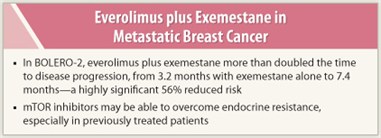 Signaling of mammalian target of rapamycin (mTOR) is required for estrogen-induced breast tumor cell proliferation, and hyperactivation of the mTOR pathway is observed in endocrine-resistant breast cancer cells. Clinically, this makes for a rational one-two punch in endocrine-resistant breast cancer, targeting the estrogen receptor (ER) and inhibiting mTOR with agents such as everolimus (Afinitor), according to Ian Smith, MD, of the Royal Marsden Hospital, London.
Signaling of mammalian target of rapamycin (mTOR) is required for estrogen-induced breast tumor cell proliferation, and hyperactivation of the mTOR pathway is observed in endocrine-resistant breast cancer cells. Clinically, this makes for a rational one-two punch in endocrine-resistant breast cancer, targeting the estrogen receptor (ER) and inhibiting mTOR with agents such as everolimus (Afinitor), according to Ian Smith, MD, of the Royal Marsden Hospital, London.
Dr. Smith noted, “mTOR is a rational target to enhance the efficacy of hormonal therapy, but mTOR inhibitors may work better in patients who develop acquired endocrine resistance with a hyperactiveated mTOR pathway. In BOLERO-2, we saw the effect of this. And in an equally impressive though smaller phase II study, TAMRAD, tamoxifen plus everolimus also significantly prolonged time to disease progression with a hazard ratio in the same ballpark as BOLERO-2 [HR = 0.53].”1
Usefulness Limited to Refractory Patients?
In TAMRAD, progression was reduced by 26% in patients with primary hormone resistance but by 62% in those with secondary hormone resistance. “The gains seemed to be in the acquired-resistance group, which fits the hypothesis,” Dr. Smith noted.
If such is the case, then mTOR inhibitors may not work well in the first-line setting, agreed Eric P. Winer, MD, of Dana-Farber Cancer Center, Boston.
Dr. Winer pointed out that in another study of a different mTOR inhibitor, temsirolimus (Torisel), little to no benefit was found for the combination vs letrozole alone in the first-line metastatic setting.
“So you have two very similar drugs, given in different settings. One is very positive, and one is negative. This is hard to explain, but it seems unlikely that this difference arose by chance alone,” he told The ASCO Post. “Some have suggested that temsirolimus may have been underdosed. The other difference was that it was not given to patients refractory to aromase inhibitors, which raises the question as to whether there is upregulation of the mTOR pathway in response to resistance, which in turn could lead to greater sensitivity to mTOR inhibitors,” Dr. Winer said. ■
Disclosure: Dr. Winer has been a consultant for Novartis. Dr. Smith reported no potential conflicts of interest.
Reference
1. Bachelot T, Bourgier C, Cropet C, et al: TAMRAD: A GINECO randomized phase II trial of everolimus in combination with tamoxifen versus tamoxifen alone in patients with hormone-receptor positive, HER2 negative metastatic breast cancer with prior exposure to aromatase inhibitors. 2010 San Antonio Breast Cancer Symposium. Abstract S1-6. Presented December 9, 2010.


